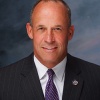A few days ago at a news conference, I introduced Dr. Amir Al-Khafaji, head of Bradley University’s Department of Civil Engineering and Construction, as the chair of the new Peoria Race Relations Commission. Readers of this column will recall that I announced the creation of this commission in my State of the City address in January.
As Dr. Al-Khafaji spoke with the media, I was reminded how very fortunate Peoria is to have men and women of his caliber and dedication willing to volunteer for our many City-affiliated boards and commissions. It also reminded me of a question I occasionally hear when visiting with citizens or addressing various groups: “Why do you have commissions when you have an elected City Council that represents the people in the first place?”
Good question. The short answer is that boards and commissions make us a better city by providing many avenues for communication and problem solving. The fact is that a City Council of 11—10 council people and the mayor—simply cannot be expected to have all the knowledge and skillsets essential for leading public policy in a modern urban community like ours. Keep in mind that city government epitomizes local self-government and grassroots democracy. I believe that democratic self-government can never have too much constructive, well-intentioned input from the citizenry.
Boards and commissions augment the ability of the Council to make sound decisions based on extensive citizen input, concerns, knowledge and on-the-street experience. These bodies provide opportunities for committed, conscientious citizens to fill a highly valuable public role by agreeing to serve as a board or commission member.
At present, I have the responsibility of appointing citizens to 37 committees or commissions, ranging from an Advisory Commission on Human Resources to the Zoning Commission. These bodies are composed of 341 people from all walks of life, educational backgrounds and skillsets. After approval by the council, they become a huge reservoir of information, advice and counsel.
These groups play another critical role. Their membership often includes those from other communities who recognize that Peoria’s betterment and success is directly correlated to the overall economic and social progress of the entire metropolitan area. Indeed, Peoria is blessed that many leaders in business, education, healthcare, government and social services who do not live in Peoria are willing to donate countless hours of time, talent and treasure to our city’s progress.
When I originally visited with Dr. Al-Khafaji about the possible make-up of the Peoria Race Relations Commission, I was amazed at the breadth and depth of membership he suggested. We were thinking along parallel paths.
In making appointments to these groups, I look for individuals who meet seven general characteristics: personal commitment to the commission’s mission; community awareness and involvement; strong personal character and integrity; an area-wide frame of reference; professional, technical and/or practical skill in the respective subject matter; a diversity of social and ethnic backgrounds; and the courage, wisdom and perseverance to tackle some pretty tough issues.
Peoria has always benefited from the great volunteers on our committees and boards who perform such valuable work. Some of these bodies accomplish their intended objective and then close up shop. But, typically in cases like this, the dedicated individuals volunteer for other boards or commissions and continue to contribute to the community’s general welfare.
While the actual mix of commissions may change over time, what does not change is that Peoria could not grow, prosper and govern effectively without them. To the 341 people who serve on our 37 bodies, I extend my heartfelt appreciation from a grateful community. IBI

